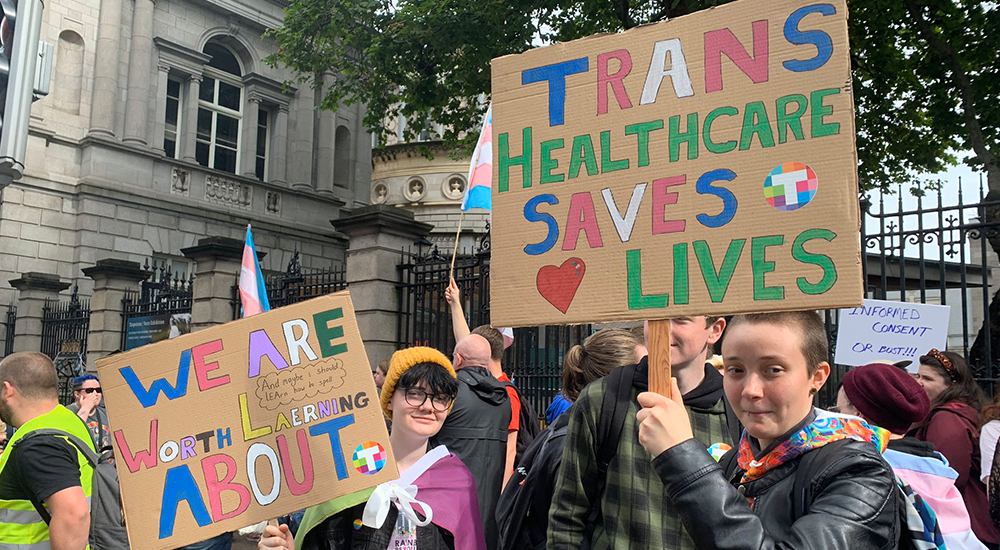By Miranda Stewart
As the capitalist system struggles for a stability that can never come, right-wing backlash against marginalised people has found momentum. Attacks on transgender and intersex people’s rights are part of that backlash.
As with right-wing conspiratorial rhetoric about care like abortion and vaccinations, healthcare for transgender people is actively misrepresented to the general public. There have been new attacks on access to healthcare for transgender people, such as a recent Florida law allowing healthcare providers and insurers to deny care to transgender people on the basis of personal beliefs. Efforts to amend the law to stop discrimination on the basis of gender identity or sexuality — as the law technically does for other aspects of identity — were rejected, making the transphobic and queerphobic intent of the law clear.
The denial of even non-transition-related care to transgender people is a real danger. Even without hostile laws, transgender people face many barriers to care: from cost, to harassment, to direct discrimination such as denial of care, to what is sometimes called ‘trans broken arm syndrome’ — the attribution of unrelated health problems to transition-related care. Healthcare providers themselves can also lack education about transgender healthcare, making it unavailable even from some providers who would have been willing to provide it.
Bans and restrictions on gender-affirming healthcare is a common form of attack on transgender people internationally. Certain places have been hotspots of that backlash, such as the United States and Britain, but nowhere are transgender people safe from such attacks. That is particularly a result of active efforts to export transphobic ideology from those places, in an echo of earlier colonial propaganda and enforcement of gender norms that is at the root of much of the transphobia and queerphobia present around the world today.
Current transphobic backlash is similar to earlier moral panics, such as those against gay people in the 1980s. It targets and scapegoats marginalised people in order to manufacture support for a wider regressive agenda. The intent of laws against transgender healthcare is not to protect anyone or address any problem, but to erase transgender people from society.
It is vital that we resist transphobic propaganda. Understanding the basics of what gender-affirming healthcare actually is can help in doing so. While standards of care vary from place to place, the main aspects are now fairly consistent and evidence-based. Some places operate on an informed-consent model (such as states like New York in the U.S.). Others have more restrictive systems (such as the public healthcare system in Ireland, where legal options are inaccessible to many). And there are also places, including entire countries, where transition-related healthcare cannot legally be accessed.
In all of these places, however, transgender people continue to exist and to seek out the care they need. Restricting transgender healthcare does not make trans people cisgender; instead, it endangers us and is an attempt to make us invisible to the public eye, so our humanity and the possibilities beyond patriarchal gender norms will be hidden.
What is gender-affirming healthcare?
In places where care is relatively available, there are a number of evidence-based treatments that are part of standard care. Gender-affirming-healthcare for transgender people can include puberty blockers, hormone replacement therapy (HRT), and surgical interventions. It can also include mental health services.
Much of the backlash to healthcare for transgender people has focused on healthcare for young people (sometimes minors under 18, and sometimes past that age). To deny youth healthcare is not only to delay it, but to potentially reduce the effectiveness of subsequent care in managing dysphoria / creating the physical appearance patients want / are comfortable with, as it forces youth to undergo a form of puberty contrary to their identity / wishes. Denial of care forces young people to experience unwanted physical changes they may not be able to fully reverse, and can cause significant psychological harm.
Puberty blockers: One form of treatment specific to youth is known as puberty blockers; generally that refers to gonadotropin-releasing hormone (GnRH) analogues. Puberty blockers were first used to treat early puberty and are still used commonly for that purpose today. Like many treatments for transgender people they were first developed for the needs of cisgender people. Laws restricting their use for transgender youth have made exceptions for their use for cisgender youth experiencing early puberty, which shows the true discriminatory intent behind laws restricting them.
For transgender and other gender-diverse youth, puberty blockers are a temporary measure allowing time for them to decide which form of puberty they are more comfortable undergoing. They have not been shown to have any significant lasting effects; instead, they allow youth to pause the continuation of permanent changes, making it easier to avoid rushed decisions or worsened outcomes later on, as well as mitigating dysphoria in the present.
Hormone replacement therapy: A particularly common form of gender-affirming healthcare is hormone replacement therapy (HRT). Those who use testosterone include many trans men, transmasculine people, and non-binary people. It can also include oestrogen, progesterone, and spironolactone. They are used in varying combinations including by trans women, transfeminine people, and non-binary people. The dosage levels and combinations of HRT prescriptions can vary depending on the goals and physical needs of the individual.
HRT acts to increase the levels of hormones which promote the secondary sex characteristics most comfortable for trans patients, while also reducing the levels of the hormones that have unwanted effects. Hormone levels are typically monitored via blood tests, to determine if prescriptions should be adjusted; hormone levels are typically set to be similar to those of the average cisgender person of the relevant gender, though sometimes lower if more gradual or slight effects are preferred by the patient. Transgender women receiving HRT, for example, generally reach both oestrogen and testosterone levels similar to those of the average cisgender woman, with the same general physical effects as well (such as on body fat distribution, bone density, and muscle mass development in response to exercise).
The effects of HRT for transgender patients have similar effects to those of puberty for most cisgender people. Potential health effects are also similar, such as those on cardiovascular health or bone density. Fertility can be affected but is not necessarily prevented by HRT treatment. In informed-consent systems, possible effects and the options for management of those effects are discussed before HRT is prescribed, with the patient able to choose between the medically available options. Some unrelated health conditions or intersex variations, as well as some surgical procedures (such as hysterectomies or orchiectomies), can mean that HRT is necessary in additional ways for the physical health of transgender people.
Surgery: Healthcare for gender transition can also include surgical procedures (such as those commonly referred to as top or bottom surgeries). Surgical interventions for gender transition are rare under age 18, and are generally limited to top surgery. Options are varied, but are often restricted by cost as well as by scarcity of providers or by legal restrictions. Other interventions are also used such as hair removal and medication to affect patterns of hair growth (such as finasteride).
Double Standards of Care
The same care which is being restricted for transgender people is much more available to cisgender people. HRT is prescribed for a number of conditions for cisgender people, such as the effects of menopause, PCOS, or low testosterone levels from illness and natural variation. (When HRT is physically necessary for transgender people for similar reasons, it can still be more difficult to obtain the appropriate type of HRT than it would be for a cisgender person with the same condition.)
Surgical procedures similar to or identical to that used for gender affirmation for trans people are also regularly provided to cisgender people, including mastectomies (for cis women and for cis men), breast augmentation, face reshaping (often called facial feminization surgery), and genital reconstructive surgery. All are provided to cisgender people whether due to illnesses, injuries, or cosmetic preferences. All were also initially developed for use on cisgender people and / or for use on intersex people to assign binary gender.
The situations where gender-assigning procedures are performed without informed consent are explicitly allowed by anti-trans legislation; intersex genital mutilation is still allowed in many places, because it reinforces binary standards useful to a patriarchal system. Intersex people are born with physical traits that do not seem to fit typical definitions of either male or female. Those whose intersex traits are observed at birth are sometimes subjected to medical procedures meant to make them fit perceived societal standards for whichever binary gender they were assigned. It remains legal in most of the world.
Proven benefits
Gender-affirming healthcare for transgender people is not experimental. Hormone replacement therapy has existed since the 1930s (testosterone in 1935, oestrogen in 1938) and various forms of gender-affirming surgery have existed just about as long. Transgender and gender-diverse people ourselves, meanwhile, have existed under various terms and social frameworks throughout human history. No lack of acceptance and care has ever made us cisgender; it has only caused human suffering.
The positive impact of informed-consent transgender healthcare is demonstrable. So are the harms of restricting it. Mental health is improved considerably by access to gender-affirming healthcare. Delays in care, meanwhile, have been shown to increase risks of depression and suicide attempts, particularly for transgender youth.
Gender-affirming care is vital for the wellbeing and sometimes survival of many people. Many of the problems that do exist in accessing satisfactory care stem from restrictive and one-size-fits-all approaches to care, which sets medical providers as opponents who patients must convince they deserve care, rather than discussing their care and needs freely. Transgender people, like all people, instead deserve accessible, respectful, and patient-directed informed-consent care.
There is a widespread misinterpretation of what gender-affirming healthcare actually means. It involves no pressure to transition; instead it means accepting a person as they are. It means supporting them through the process of developing their own identity and transitioning (or not) in the ways they choose for themselves. It is, in other words, the opposite of conversion therapy. There is a continuous denial of the agency of transgender people, especially transgender youth, in the myth that not forcing them to live as cisgender means instead forcing them to live otherwise, as if they are merely a body to be acted upon rather than a whole person with the capacity for their own thoughts and feelings.
Healthcare is sometimes denied on a discriminatory basis beyond age restrictions, even in places where transition care is legal. Disabled transgender people, for example, can be even more likely to have negative experiences when seeking healthcare than non-disabled transgender patients. Denials of care are sometimes justified by beliefs that transgender people are unqualified to make decisions about our own bodies, and by beliefs that frame successful treatment as fitting cisheteronormative standards of appearance and behaviour, rather than improved quality of life (in other words, happiness and wellbeing of the trans person themselves).
Misinformation about ‘regret’ and detransitioning
Fear mongering about trans healthcare often raises the possibility of regret, arguing that those transitioning are not competent to make their own choices. Cases of detransition (returning to living socially as the gender one was assigned at birth), for example, are used as a weapon against trans people by those who assert we cannot choose what to do with our bodies in our own best interest. This does a disservice to the vast majority of detransitioners as well as to those who do not detransition.
When discussing the numbers of detransitioners, it is important to be clear on what that actually means: the majority of those who reverse their social transition do not cite questioning their identified gender as a factor, but instead describe difficulties caused by societal transphobia, such as discrimination and family rejection. Even then, it does not necessarily imply regret at having ever transitioned. And most significantly, the vast majority of transgender people do not ever choose to detransition. We are overwhelmingly happier as ourselves despite the consequences society imposes.
Moreover, when we look at the fear mongering about regret, what exactly are we afraid will happen to people? That they will have physical traits that do not suit their gender identity and preferred appearance? That begs the question of why that same situation should be forced on large numbers of transgender people instead, with no choice in the matter, to prevent a small number of cisgender people from possibly experiencing the same? That is also shown to be a false choice regardless, as any detransitioning people would be more freely able to choose and access the care they need to alleviate that dysphoria within the same informed-consent system that transgender people need.
The spectre of potential dysphoria for a small number of cisgender people is often portrayed as more important than similar suffering when experienced by large numbers of transgender people. Restrictions on trans healthcare are built on the assumption that trans lives are less valuable.
The rhetoric against trans healthcare relies on the idea that being transgender or even looking transgender is a negative outcome; that non-normative bodies are defective. The denial of healthcare on the basis of neurodivergence is not the only way that ableism manifests in denial of transgender healthcare. It returns to the idea that people’s bodies are not their own, but instead must serve a purpose determined by others; under a capitalist system, gendered ways in which their labour and selves can be exploited (including reproductive labour, and sexual desirability and availability to those with more social power).
Socialism vs scarcity
Healthcare workers, both trans and cis, are also being affected by transphobic laws. Much of the legislation removes access by punishing healthcare workers who provide care to transgender patients, making it dangerous or impossible to do so.
Healthcare workers are also affected by the current lack of universal, well funded, adequately resourced healthcare. The systemic deprivation of resources and funding for transgender healthcare, and for all healthcare, promotes denial of care, such as trying to prevent access by those who they suspect of not truly needing or deserving care as much as other patients. That creates conflict between patients and providers, and even among patients who may perceive themselves as competing for scarce resources. But let’s be clear: scarcity exists today because profit is prioritised over patients and workers in private healthcare, and because austerity measures in public healthcare structures have been used to direct resources towards those in power rather than the public good.
In reality, scarcity is preventable if health care systems are fully publicly-funded and under the control of and in the interests of those affected. The best way to replace gatekeeping and harm with full access to healthcare is to have systems directed by both patients and healthcare workers. Access to care should never be restricted by outside parties, and healthcare workers should not be placed in the role of rationing scarce resources.
The conditions for truly accessible healthcare that supports liberation rather than oppression of transgender and gender non-conforming people requires mass campaigning by the trans community, as part of a struggle by the multi-gendered working class for a quality public healthcare system for all. Rainbow capitalism and the political systems that serve profit motives will not save us. Mass protest, strikes, organising, and solidarity for all struggles against oppression and exploitation are what we need.












